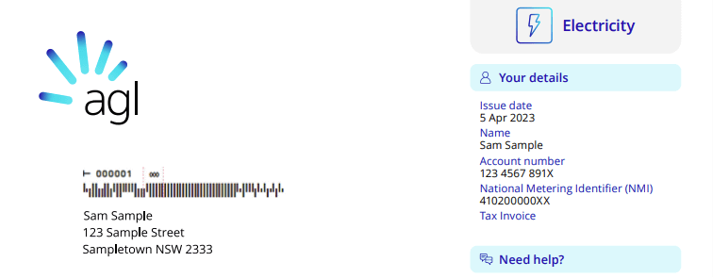KEY POINTS
- To find out who your electricity supplier is, you can either check your recent energy bill, speak with the person paying it or call your electricity distribution network.
- An electricity supplier is the retailer that charges you for using electricity or gas.
- Not knowing your electricity supplier may indicate you’re not on the most competitive energy plan in your state/territory.
On this page:
Compare energy deals
Here are some sponsored deals from the retailers on our database that include a link to the retailer’s website for further details. These are products from referral partners†. These costs are based on the Ausgrid energy network in Sydney but prices may vary depending on your circumstances. This comparison assumes general energy usage of 3900kWh/year for a residential customer on a single rate tariff. Please use our comparison tool for a specific comparison in your area and to see other products in our database that may be available. Our database may not cover all deals in your area. As always, check all details of any plan directly with the retailer before making a purchase decision.
|
9% Less than reference price |
$1,791 Price/year (estimated) |
Go to Site |
Here are some sponsored deals from the retailers on our database that include a link to the retailer’s website for further details. These are products from referral partners†. These costs are based on the Citipower network in Melbourne but prices may vary depending on your circumstances. This comparison assumes general energy usage of 4000kWh/year for a residential customer on a single rate tariff. Please use our comparison tool for a specific comparison in your area and to see other products in our database that may be available. Our database may not cover all deals in your area. As always, check all details of any plan directly with the retailer before making a purchase decision.
 |
|
10% Less than VDO |
$1,392 Price/year (estimated) |
NA |
Who is my energy provider?
An electricity provider (also known as a ‘utility provider’, ‘energy provider’, ‘energy retailer’ or ‘power company) is the company that bills you for using electricity or gas and being connected to the energy grid.
Here are three steps to find out who your electricity provider is:
1. Check your last electricity bill
One simple way of finding out your current electricity supplier is by checking your latest electricity bill.
Below is an example of an AGL electricity bill, with the electricity provider’s name clearly marked at the top left corner.
If you haven’t received a paper invoice, you may be signed up for a digital bill-only plan, so be sure to check your emails.

Source: agl.com.au
2. Speak with the person who usually pays the electricity bill
If you have taken over the responsibility of paying the electrical bill, you should speak with the last person who was in charge of paying that bill.
Once you’ve found out who your electricity provider is (see step 1), you’ll also need to get the energy bill transferred into your name by contacting the electricity provider and updating the contact details, bank details and email address on file for that bill and that address.
If you’ve just moved into a new house and are unsure about your energy situation, it’s worth getting in touch with your landlord or real estate agent, who can assist you with what you need to do.
3. Call your electricity distribution network
If you can’t find an old bill and have no contact with previous bill-payers, there are still ways to find out which energy provider is registered to your address.
Because electricity is supplied through a location-based distribution network, you can contact them directly to find out which electricity provider you need to speak with.
Below are the contact numbers of the distribution networks within competitive energy markets in Australia.
| Distribution Network | Location | Contact Number |
|---|---|---|
Queensland |
||
| Energex | Brisbane, Moreton Bay, Redlands, Ipswich, Logan, Gold Coast, Sunshine Coast and surrounds | 13 12 53 |
| Ergon Energy | Regional Queensland, from coastal and rural areas to the Torres Strait | 13 10 46 |
New South Wales |
||
| Endeavour Energy | Sydney’s great west, the Blue Mountains, Southern Highlands, the Illawarra and the South coast. | 13 37 18 |
| Essential Energy | Country and regional NSW, southern regional QLD | 13 23 91 |
| Ausgrid | Inner, northern and eastern metropolitan Sydney, Hunter Valley and surrounds | 13 13 65 |
South Australia |
||
| SA Power Networks | All of South Australia | 13 12 61 |
Australian Capital Territory |
||
| EvoEnergy | Most of the ACT | 13 23 86 |
| Essential Energy | A small portion of the ACT, plus Queanbeyan area | 13 23 91 |
Victoria |
||
| Citipower | Melbourne City and inner suburbs | 1300 301 101 |
| Jemena | Northern and south western suburbs | 1300 131 871 |
| Powercor Australia | Western suburbs and western Victoria | 13 22 06 |
| Ausnet Services | Outer northern and eastern suburbs and eastern Victoria | 1300 360 795 |
| United Energy | Southern suburbs and Mornington Peninsula | 1300 131 689 |
Tasmania |
||
| TasNetworks | All of Tasmania | 1300 137 008 |
Current as of July 2025.
If you live in Western Australia or the Northern Territory, where the local electricity markets are non-competitive, the need to contact your energy supplier is less important. This is because energy prices are regulated, meaning you don’t have a choice of retailer.
However, it’s still important to contact your electricity supplier to ensure the account is in your name and your billing details are accurate. You may even be able to benefit from a different electricity tariff that better suits your energy habits.
Why should I find out who my electricity supplier is?
If you’re not sure what energy supplier you’re with, there’s a good chance you’re not on their most competitive plan and could be paying much more than you need to. If you’re interested in finding out if you could be saving on your electricity bill, check out the below deals and see how your electricity provider and energy plan stacks up against others in your area.
Compare electricity providers
When researching electricity and who provides it to you, it is important to note that the term ‘electricity provider’ is synonymous with ‘electricity supplier’ and ‘energy retailers’. Use these terms when searching your current or future electricity provider.
Below are some of the cheapest electricity deals offered by energy suppliers. Click on your state to see prices.
Here are some of the cheapest published deals from the retailers on our database that include a link to the retailer’s website for further details. These are products from referral partners†. These costs are based on the Ausgrid network in Sydney but prices may vary depending on your circumstances. This comparison assumes general energy usage of 3900kWh/year for a residential customer on a single rate tariff. Please use our comparison tool for a specific comparison in your area. Our database may not cover all deals in your area. As always, check all details of any plan directly with the retailer before making a purchase decision.
Here are some of the cheapest published deals from the retailers on our database that include a link to the retailer’s website for further details. These are products from referral partners†. These costs are based on the Citipower network in Melbourne but prices may vary depending on your circumstances. This comparison assumes general energy usage of 4000kWh/year for a residential customer on a single rate tariff. Please use our comparison tool for a specific comparison in your area. Our database may not cover all deals in your area. As always, check all details of any plan directly with the retailer before making a purchase decision.
Here are some of the cheapest published deals from the retailers on our database that include a link to the retailer’s website for further details. These are products from referral partners†. These costs are based on the Energex network in Brisbane but prices may vary depending on your circumstances. This comparison assumes general energy usage of 4600kWh/year for a residential customer on a single rate tariff. Please use our comparison tool for a specific comparison in your area. Our database may not cover all deals in your area. As always, check all details of any plan directly with the retailer before making a purchase decision.
Here are some of the cheapest published deals from the retailers on our database that include a link to the retailer’s website for further details. These are products from referral partners†. These costs are based on the SA Power network in Adelaide but prices may vary depending on your circumstances. This comparison assumes general energy usage of 4000kWh/year for a residential customer on a single rate tariff. Please use our comparison tool for a specific comparison in your area. Our database may not cover all deals in your area. As always, check all details of any plan directly with the retailer before making a purchase decision.



Share this article